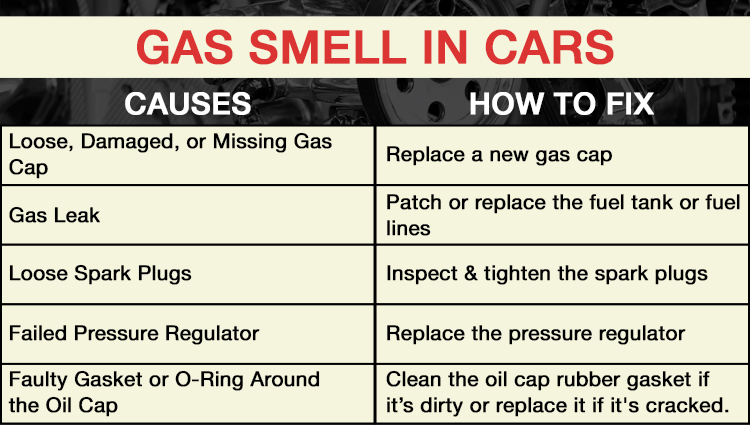The smell of gasoline in your vehicle’s cabin is a cause for concern. If you’ve just made a stop at a gas station, the smell of gas may continue to linger for a few minutes after a fill up. However, if the odor is coming from inside your vehicle, it may indicate a much bigger problem.
In this article, I’ll go over all the potential causes for the fuel smell and what to do when you encounter any of these issues. I’ll also answer some vital questions, including whether you should even continue driving if you can smell gas from inside your vehicle.
5 Causes Smell Like Gas In Cars
1. Loose, Damaged, or Missing Gas Cap
If you smell gas when you start your car, a missing, loose, or damaged gas cap could be causing gas to escape in the form of vapor. The first thing you’ll want to do is check whether you closed your gas cap after refueling. Similarly, check if the gas cap is tightly secured. If not, it could be allowing fumes to enter your cabin.
In addition, if the seal on your gas cap is broken or has cracks, you may smell gas fumes.
What to do:
The good thing with a missing or loose gas cap is that you don’t necessarily need to smell gas to know there’s a problem. A check engine light is a car care precaution that will show up if the fuel tank’s pressure is not maintained.
The gas cap is connected to your car by a little rubber tether for many vehicles. All you need to do is replace the gas cap securely. However, if you lose your gas cap a few miles down the road, you can always improvise. In this case, use a rag to close the filler neck to prevent sloshing and evaporation of gas.
After which, you’ll want to buy a new gas cap as soon as possible. The same applies if you’re dealing with a cracked gas cap. It’s pretty inexpensive, and replacing it is also simple.
2. Gas Leak
A gasoline leak is another common reason why your car smells like gas. As the leading cause of vehicle fires, you should not ignore a gas leak. To this end, gas leaks can come from a punctured or degraded fuel tank or damaged fuel lines.
Your gas tank and fuel lines are subject to wear and tear like other parts of your vehicle. Typically, you will see a puddle of gas under your car when there’s a gas leak. In addition, you will notice that your fuel gauge is dipping quickly. For example, you may find that your fuel level has gone down overnight.
See Also – What’s Leaking? (9 Car Fluids and Their Colors)
What to do:
It would help if you did not drive with a gas leak. Instead, have the car towed and brought to an auto repair shop. A mechanic will determine the cause of the gas leak and the appropriate procedure for repair. For example, a small hole in the gas tank can be patched, while a large gap can require replacing the fuel tank.
You will also require new fuel lines if the old ones are damaged. Plus, ensure that the new fuel lines conform to the old lines you are replacing.
3. Loose Spark Plugs
The spark plugs play an essential role in delivering the spark igniting the fuel-air mixture to start your vehicle. If spark plugs are loose, the O-ring seal can leak fumes from the fuel combustion chamber next to the ventilation system. That’s how the gas smell reaches your cabin.
What to do:
You can inspect the spark plugs or have a mechanic do it for you. If you see oil on your spark plugs, make sure to resolve the oil leak before replacing them. If it’s been a while since you performed DIY car maintenance, it may be time for a tune-up. You will require a wrench to tighten the spark plugs appropriately.
Note that spark plugs should not be too tight. If you can’t tell whether your spark plugs are too tight, have a mechanic check them for you.
4. Faulty Pressure Regulator
A failed pressure regulator can also cause the smell of gas in your car. It interferes with the fuel mixture since it causes it to be too thick or too thin. When the fuel mixture is off, the engine burns excess fuel causing fumes to sit inside the exhaust.
What to do:
A bad fuel pressure regulator causes engine misfires and poor acceleration. You will also see a decrease in fuel efficiency since it starves the engine causing it to lose power. The best fix for this problem is to replace the pressure regulator. DIYers can do this at home, but most people prefer a professional to do it.
Read Also – How to Dispose Old or Stale Gasoline
5. Faulty Gasket or O-Ring Around the Oil Cap
This is another common cause of gas smell in your car. It’s pretty easy to diagnose this problem since you don’t need to jack up your vehicle. The oil cap closes the oil reservoir. If it is loose or is not seated correctly, it will allow oil fumes to make their way into the cabin through the HVAC system.
What to do:
Inspect the oil cap rubber gasket for cracks or debris. If it’s full of gunk, clean it well and return it. However, if it’s cracked, you will need a new one. Anyone can replace a damaged oil gasket at home since it goes right where the old one was.
Is It Safe to Drive a Car That Smells Like Gas?
In most cases, it is not safe to drive if your car smells like gas.
Even though some of the reasons that cause the smell of gas are harmless, you don’t know the seriousness of the problem until you check it out. Simply inhaling gas can make you sick and fatal in extreme cases. Hence, it’s best to troubleshoot the problem as soon as possible.
See Also – 4 Causes of White Smoke From the Exhaust
How to Prevent the Smell of Gas in Cars
They say prevention is better than cure, and this phrase applies precisely in the case of gas smells. Proper car care and maintenance will help you prevent most of the causes of a gas smell in your car.
It is recommended to service your vehicle after every 12,000 miles. This process will catch problems before they become expensive repairs.
Here are some ways to prevent the smell of gas in cars.
- Make sure you secure the gas cap after refilling.
- Please inspect the condition of the gas cap when servicing your vehicle and replace it if it shows signs of damage.
- Tune-up spark plugs as per your car’s service manual.
- Inspect the oil cap gasket or O-ring when changing the oil every 5,000 to 7,000 miles.
See Also — 6 Car Fluids That You Need to Check Regularly
Diagrams copyright Tim Miller. All rights reserved.
- What the Letters and Numbers On an Automatic Gear Shift Mean - Sep 12, 2022
- How Long Does it Take to Change Tires? (Professional vs DIY) - Jun 8, 2022
- 2022 Ford Bronco EcoBoost Performance & Off-Roading Specs - Jun 2, 2022


